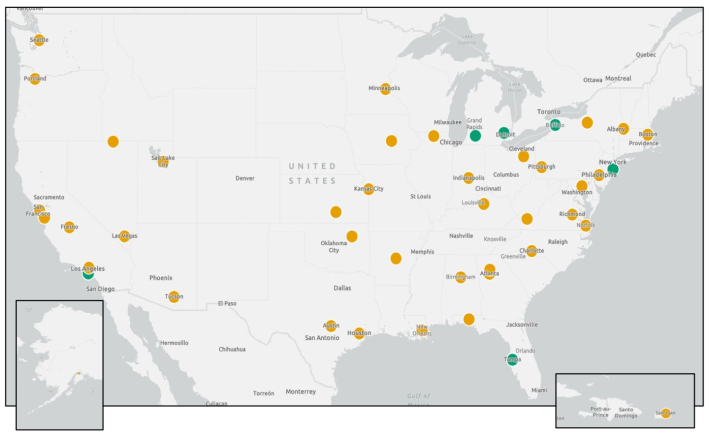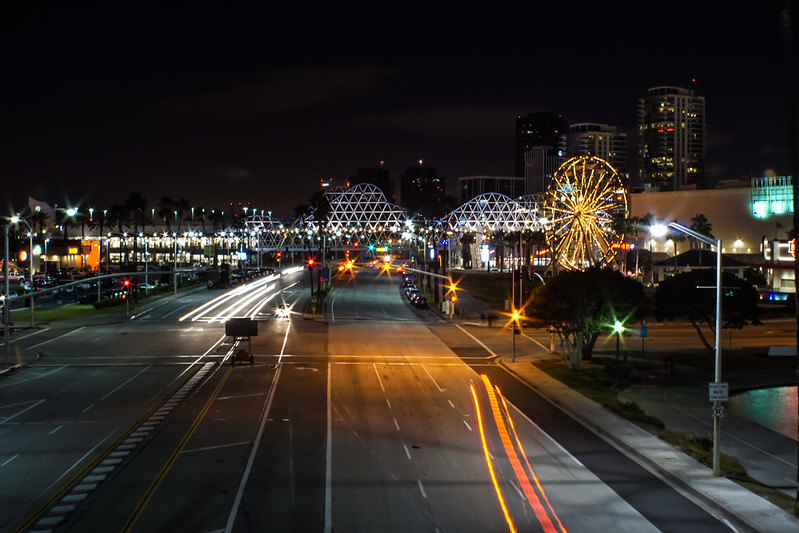The federal Department of Transportation's first picks for a historic new grant program aimed at repairing neighborhoods torn apart by highways were met by applause from advocates — even as they cautioned that far more remains to be done.
On Feb. 28, the Biden Administration announced the first-ever recipients of the Reconnecting Communities grant program, a new effort to help U.S. cities remove, bridge, cap, convert, or otherwise alleviate the burdens of highways and other transportation barriers in their neighborhoods.
This year's grantees will split a total of $185 million, and most will be allocated to just six infrastructure projects:
- $56 million for Buffalo, N.Y. to cap the Kensington Expressway and top it with a complete street, which has been a goal of local advocates since the 1980s
- $30 million for Long Beach, Calif., to convert a segment of I-710 (known locally as Shoreline Drive) into a boulevard
- $21 million for Oak Park, Mich. in metro Detroit to replace a failing deck above a freeway that would otherwise bisect the region's Orthodox Jewish community
- $13 million for Long Branch, N.J. to build a pedestrian tunnel to a hard-to-access rail station
- $12 million for Kalamazoo, Mich. to redesign dangerous one-way roads that isolate Black neighborhoods on the north side from opportunity
- $5 million for Tampa to remove a downtown flyover ramp that destroyed the region's center of Black business and culture

Another 39 communities also won grants to plan for future highway remediations, including:
- $2 million to study "removing, retrofitting, or modifying" Baltimore's infamous "Highway to Nowhere"
- $2 million to study the development of the Rondo Land bridge in St. Paul, Minn., which Streetsblog featured in 2021
- $2 million to study capping a recessed segment of highway known as the Downtown Inner Loop in Indianapolis
- $ million to study a highway-to-boulevard project in Las Vegas
- $1.8 million to study reconnecting the land over an open-cut highway in Boston's Chinatown neighborhood (read more at Streetsblog Mass)
- ...And another $1.8 million to study a highway cap in Philadelphia's own Chinatown
- $1.6 million to study the removal of a highway segment in downtown Tulsa.
- $1.1 million to study a proposed highway cap in downtown Atlanta known as "the Stitch"
- $800,000 to study how to use the highway cap over I-5 in Portland, Ore. for the benefit of existing residents of the historically Black Albina neighborhood
- Planned projects in Oakland, Pasadena, Fresno, and San Jose (learn more at Streetsblog Cal).
And that long list, advocates stress, is only the tip of the iceberg.
Because hundreds of predominantly BIPOC communities across America have had their homes destroyed to build highways, DOT reportedly received 10 times as many applications as it was able to accept this year. The meager $5 billion that Congress granted the program over the next five years won't be enough to help all of them — to say nothing of the victims of all the new highways that are still being built today, funded in part by the $110 billion in unrestricted federal roadway dollars that will be allocated to state DOTs over the same period.
“These grants are a good start toward building thriving, resilient cities with affordable housing and the right transportation options," said Deron Loaves of the National Resources Defense Council. "But this is also just a start. ... The Federal Highway Administration needs to make sure it’s not repeating the mistakes of the past with new highway projects.”

Happily, US DOT mostly avoided the trap of awarding grant dollars to projects that would expand highways while simultaneously outfitting them with nominal community improvements — with a few unhappy exceptions. Little Rock, for instance, will receive $2 million to build a freeway deck park over Interstate 30, without halting the lane additions that the state is currently building.
"For all intents and purposes, these investments seek to repair the damage highway expansions are causing right now," wrote Ben Crowther at America Walks. "US DOT should leverage the Reconnecting Communities program to discourage state DOTs from literally being able to cover their mistakes in real-time."
Other projects, meanwhile, received criticism for not being ambitious enough. The Louisiana Department of Transportation, for instance, received $500,000 to study the possibility of repurposing the area under the I-10 overpass — known locally as "the Monster" – as well the making unspecified "improvements" to the highway itself. Local advocate Amy Stelly characterized the proposal as an effort to "decorate under the toxic, noisy expressway."
With one-fifth of an already-small grant pool now exhausted, advocates emphasize that it will be up to transportation officials to pick up the slack, and use every dollar possible to heal highway harms — and stop creating new ones.
“It’s important to remember that vast sums of taxpayer dollars are still being allocated to building and expanding highways that will tear other communities apart," said Laura Davis, transportation advocate for the U.S. Public Interest Research Group. “We need to invest more of our federal and state dollars in high-quality public transportation and interconnected pedestrian and cycling infrastructure, since these solutions will result in better health outcomes, less traffic congestion and cleaner air for everyone.”






